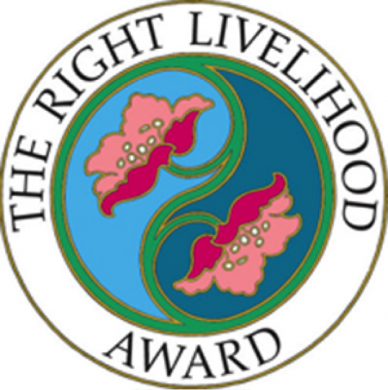Since 1980 The Right Livelihood Award Foundation has given what has become known as ‘The Alternative Nobel Prize’.
These awards are given to individuals and groups who have done practical work to help people and the planet.
The awards are now globally recognised. Wangari Maathai actually gained the Right Livelihood Award in 1984 and the Nobel Peace Prize in 2004.
You can discover more at the Foundation’s website.
http://www.rightlivelihood.org/index.html
Background To The Awards
The awards were introduced in 1980 by Jakob von Uexkull. Born in Uppsala, Sweden, he came from a family of pioneers.
Both his grandfather, also called Jakob, and his father, Thure, did groundbreaking work in their respective fields. They focused on biosemiotics and the environment’s influence on living systems. Thure applied these principles to the study of psychosomatic medicine.
(Biosemiotics investigates the myriad forms of communication and signification found in and between living systems.)
Jakob went his own way on the road to creating the Right Livelihood Awards. His father, Thure, was a pacifist who gave his son stamps, rather than guns, as a child.
Jakob went on to become a philatelist and stamp trader. The latter led to him creating a successful business, which he sold to fund the first five years of the Right Livelihood Awards.
His initial move was to approach the Nobel Foundation. The original categories for the prizes had been set in a different world, said Jakob.
Would it be possible to create awards for people tackling the present challenges facing humankind? The Nobel Foundation were polite, but said that no new categories would be added.
He responded by creating the Right Livelihood Awards. The first ceremony was held in Stockholm in a rented hall. Now they are given in the Swedish Parliament. The aims are:
To honour and support those offering practical and exemplary answers to the most urgent challenges facing us today.
Why Right Livelihood?
Right Livelihood is a Buddhist term. In that context it refers to earning a living in a way that does not harm others or the world. This is part of The Noble Eightfold Path, which encompasses the following principles.
Right View.
Right Intention.
Right Speech.
Right Action.
Right Livelihood.
Right Effort.
Right Mindfulness.
Right Concentration.
Jakob explains that he chose the term Right Livelihood to symbolise ‘the whole life’. It should focus not only on what people do, but how they live their lives. He says that in some languages, however, it is hard to translate the title. So it has increasingly become known as the Alternative Nobel Prize.
He was driven to start the prizes in order to break silences. He wondered: Why do we always live with problems that we know we can solve?
The Awards continue to ensure that solutions to the world’s challenges are taken seriously. They show how individuals and organisations are doing good work that helps both people and the planet.







Leave a Reply